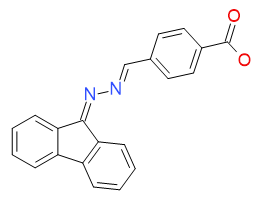|
4-[(1E)-{2-[(9E)-9H-fluoren-9-ylidene]hydrazin-1-ylidene}methyl]benzoic acid
A novel inhibitor of the ATP-binding cassette transporter ABCG2 (IC50 = 4.3 µM)

Chemical Formula: C21H14N2O2
Molecular Weight: 326.3579
OTAVAchemicals Catalogue Number: 3463893
CAS Registry Number: 904229-76-1
Purity: 95% (HPLC)
Ref.: Curtis J. Henrich, Robert W. Robey et al. New inhibitors of ABCG2 identified by high-throughput screening. Molecular Cancer Therapeutics (2007), 6(12), 3271-3278
Abstract: In order to identify novel inhibitors of the ATP-binding cassette transporter ABCG2, a high throughput assay measuring accumulation of the ABCG2 substrate pheophorbide a in ABCG2 overexpressing NCI-H460 MX20 cells was used to screen libraries of compounds. Out of a library of 7325 natural products and synthetic compounds from the National Cancer Institute/Developmental Therapeutics Program (DTP) collection, 18 were found to inhibit ABCG2 at 10 µM. After eliminating flavonoids and compounds of limited availability from the 18 original compounds, 10 of the 11 remaining compounds reversed mitoxantrone resistance in NCI-H460/MX20 cells and prevented ABCG2-mediated BODIPY-prazosin transport in ABCG2-transfected HEK293 cells, confirming an interaction with ABCG2. Based on activity profiles and a vailability of materials, 5 inhibitors were examined for their ability to compete [125I]-iodoarylazidoprazosin (IAAP) labeling of ABCG2, increase binding of the anti-ABCG2 antibody 5D3, and prevent P-glycoprotein (Pgp)- or multidrug resistance associated protein 1 (MRP1)-mediated transport. At a concentration of 20 µM, all of the compounds reduced IAAP labeling by 50-80% compared to control. All 5 compounds also increased 5D3 labeling of ABCG2, indicating that these compounds are inhibitors but not substrates of ABCG2. None of the compounds affected Pgp-mediated rhodamine 123 transport and only one slightly affected MRP-1 mediated calcein transport at 10 µM, suggesting that the compounds are specific for ABCG2. These five novel inhibitors of ABCG2 activity may provide a basis for further investigation of ABCG2 function and its relevance in multidrug resistance.
DOI: 10.1158/1535-7163.MCT-07-0352
Price info:
|
1 MG |
49 EUR |
|
5 MG |
79 EUR |
|
10 MG |
109 EUR |
|
300uL of 10mM solution |
64 EUR
|
|
 HOME
HOME ABOUT
ABOUT
 SERVICES
SERVICES
 PRODUCTS
PRODUCTS
 Targeted Libraries
Targeted Libraries
 Biochemicals
Biochemicals
 RESEARCH
RESEARCH
 DOWNLOADS
DOWNLOADS ORDERING
ORDERING
 CONTACTS
CONTACTS


